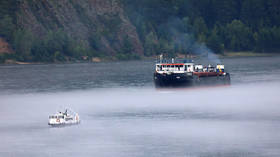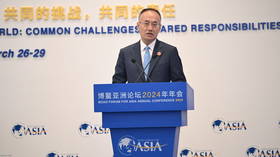Global warming to boost Russian GDP – report

Russia’s GDP could grow by 1.2 trillion rubles ($13 billion) if the average annual temperature across the country rises by one degree Celsius, according to new research. The agriculture and forestry sectors stand to benefit most from global warning, the experts who conducted it conclude.
The findings of the report by the Institute of Economic Forecasting of the Russian Academy of Sciences (IEF RAS) were presented at a forum called “BRICS Climate Agenda in Modern Conditions” which was held in Moscow on Friday.
On average, the temperature in Russia grows by 0.5 C every ten years, causing additional risks of weather extremes as well as creating challenges for the economy, said Aleksandr Shirov, the director of IEF and one of the authors of the research. However, if an efficient adaptation policy is implemented, the effects of climate change could be positive for Russia, he told the forum.
The research compared possible profits and damages in different areas of the economy, such as agriculture, extraction of mineral resources, transport and construction sectors, etc. The damage from warming by one degree Celsius in all sectors amounted to 2.45 trillion rubles ($26.8 bn), while the benefits total 3.64 trillion rubles ($39.8 bn).
“The total effect of climate change on the annual GDP in Russia is estimated at +1.2 trillion rubles (or 0.7% of GDP recorded by the end of 2023),” the report found. “Given current trends in climate change, we can say that Russia’s annual GDP will increase by approximately 0.6 trillion rubles every ten years.”
According to the study team, the main benefits come from agriculture and forestry, and from the development of the Northern Sea Route (NSR) – the shipping waterline running along the Russian Arctic coast from Murmansk to the Bering Strait and Far East. “Many industries are involved in the work of the NSR – a mega-project, the very development of which is associated with climate change,” the paper notes, referring to thinning and melting of ice that has made the east-west corridor more viable.
The researchers nonetheless also urged measures to reduce potential risks from climate change. These include, for instance, further development of the healthcare system and “mechanisms for adaptation financing and insurance,” as well as protection of ecosystems, buildings and structures from emergency situations.
Russia is the largest country in the world but about two-thirds of its territory is estimated to rest on permafrost. The study results also named top-priority steps set to reduce the impact of degradation of permafrost due to climate change. These include the development of “soil thermal stabilization practices,” and “provision of temporary storage facilities for excess water, construction and strengthening of dams, [and the] strengthening of buildings and structures.”













